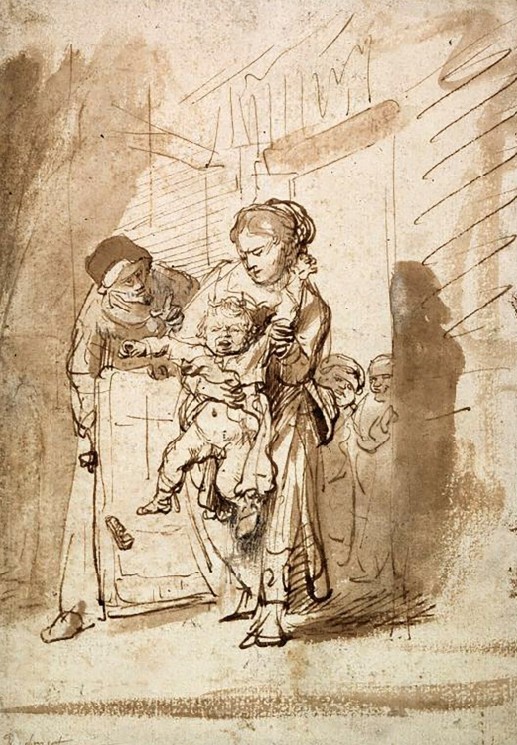In life there are a great many decisions to be made every day. For followers of Christ, these decisions are often made easier. They have the Bible as their guide (Psalm 119:105), and they genuinely know that the angels are there to help and support them (Psalm 34:7). They walk in faith (2 Corinthians 5:7), knowing that God is by their side.
But temptation to do wrong is ever present. And knowing that we serve a God who is forgiving is of itself a temptation. It can lead to “presumptuousness”. The Apostle Paul asks, ‘Are we to continue in sin that grace may abound?’ (Romans 6:1).
We may well recoil at the thought. The very question prompts a certain amount of soul searching. Could there be in my personal behaviour something which presumes that God has somehow got to forgive me? The fact is that not one of us can place God under any kind of obligation. We are all sinners, and depend on God’s mercy: ‘For God has consigned all to disobedience, that he may have mercy on all’ (Romans 11:32). When we come before God it must be in a penitent and humble frame of mind.
Call to Salvation
Salvation is dependent upon true repentance—a recognition of our need, and a desire to change because of the love of God expressed in the giving of Jesus Christ to die for our sins (1 Corinthians 15:3). This is where grace comes in. Grace, by definition, is the favour which God shows to us, which we do not deserve.
How is God’s grace spread abroad in the world? The first thing to acknowledge is that we all experience abundantly the grace of God. ‘He himself gives to all mankind life and breath and everything’ (Acts 17:25).
Sadly, people often fail to appreciate this. And even whilst we are healthy, this life is also subject to corruption and ultimately death. That is how we are. We all need redemption, and happily God has provided it through His beloved Son, the Saviour Jesus Christ.
Many will hear the Gospel’s call to salvation. God, it seems, places us in situations where we can respond to the call, positively. In Matthew 13 Jesus tells a parable of a man who sowed seed on different types of ground. The parable accurately describes people’s different attitudes to the Gospel’s call. Where the Gospel seed has fallen into the ground of a good and honest heart, there will be genuine response, life will be changed and become fruitful before God.
We will deem ourselves to have been chosen by God if, by His grace, we come to the Gospel, respond in belief, repent of our sins, and through being baptised, enter His family.
God’s Love at Work: Israel
In the Bible’s Old Testament we have the worked example of Israel who were chosen by God, out of all the nations of the earth, to be His special people and to be granted the benefit of His promises. Notice how God expresses His love for them:
You are a people holy to the Lord your God. The Lord your God has chosen you to be a people for his treasured possession, out of all the peoples who are on the face of the earth. It was not because you were more in number than any other people that the Lord set his love on you and chose you, for you were the fewest of all peoples, but it is because the Lord loves you and is keeping the oath that he swore to your fathers, that the Lord has brought you out with a mighty hand and redeemed you from the house of slavery, from the hand of Pharaoh king of Egypt. Know therefore that the Lord your God is God, the faithful God who keeps covenant and steadfast love with those who love him and keep his commandments, to a thousand generations (Deuteronomy 7:6–9).
Clearly many of the people of Israel, over the centuries, fell away, even though they had received the call. At no time was this more clearly seen than when as a nation they rejected Jesus Christ, their true Messiah. Tragically as a scattered nation over 2000 years they seem only to have become more entrenched in a position where they reject Jesus and the Gospel. But Paul tells us, ‘God has not rejected his people whom he foreknew’ (Romans 11:2). Just like everyone else they have the opportunity individually to come to the Gospel.
The Bible also tells us that as a nation the Jews have to suffer at least one more serious upheaval, in order to bring them to the point where finally they acknowledge their Saviour in Jesus Christ, their true Messiah (Zechariah 12:9–14).
Through all their history the Jews have had choices to make; God’s love has been extended to them, His pity and compassion. Unfortunately, as a nation they have been generally resistant to His overtures. However they are still witnesses to God’s love at work by their very existence (Isaiah 43:10). His covenant with them still stands, and ultimately those who acknowledge their Saviour will be saved.
God’s Love at Work: Everyone
God so loved the world, that he gave his only Son, that whoever believes in him should not perish but have eternal life (John 3:16).
Now God’s love is extended to us that we might receive the gift of grace in salvation, through Jesus Christ.
There was a rich young man who came to Jesus, keen to find salvation (Mark 10:17–22). But when challenged he went away sorrowing—his wealth was more important to him than following Jesus. Jesus was also sorrowful. Grace, compassion, love, were all held out to him, but his choice was to go away.
Isn’t that like us all? Are there things in our lives that are more important to us than the Gospel? Things we cannot give up in order to follow Jesus?
The example of Israel is a warning to us that even though we may have been called and chosen; even if we have been baptised and become a member of God’s special family—we may still ‘fall away from grace’ (Galatians 5:4). This is not a reason to doubt the love or grace of God, but it is a reason to watch ourselves, test our behaviours, maintain our humility in the face of God and develop our confidence in the Almighty Father.
Take My Yoke Upon You
Life can be very miserable. Many people have severe temptations and resort to extreme measures in their attempts to find happiness, wholeness, or a sense of identity, or just to stave off boredom. Experience shows that the recipes for happiness which the world offers generally do not deliver.
On the other hand, Jesus extends to us a simple invitation:
Come to me, all who labor and are heavy laden, and I will give you rest. Take my yoke upon you, and learn from me, for I am gentle and lowly in heart, and you will find rest for your souls. For my yoke is easy, and my burden is light (Matthew 11:28–30).
If we walk with Christ, allowing him to share our loads, watching him as our example, using him as a pattern for our behaviour and a basis for the choices we make, then he will enable us to walk in the way of life.
There are, of course, times when people say things which are hurtful, usually without realising it. Remember it is down to you whether you react, take offence or not. Faith in the Lord Jesus is the key, and we need to stay focused on him. He knows what it is like to be despised and rejected (Isaiah 53:1–3).
It is a real blessing to have a Saviour with whom we can share our problems, but more than that he knows what it is that we really struggle with; trust him, he really does know what he is doing (Romans 8:26). The Bible will always provide encouragement (Romans 15:4). And we have the assurance that the angels are ‘ministering spirits sent out to serve for the sake of those who are to inherit salvation’ (Hebrews 1:14).
The Love of God
Love bears all things, believes all things, hopes all things, endures all things. Love never ends (1 Corinthians 13:7–8).
As every good parent will know, there are times when warnings and correction have to be given—indulgence is not love!
If we see a blind person about to have an accident, a warning may be all it takes to turn them around. But it may be that we have to use physical means to rescue them, say, pushing them out of the way of an oncoming bus. To allow someone to be run over because we didn’t want to hurt them would not be showing love!
Likewise, between friends or in a family, and in the family of believers, difficult things have sometimes to be said and done which don’t immediately seem loving. But if someone is going astray and imperilling themselves, the truly loving thing for their family to do is to exercise discipline, in the hope that they will come to repentance and recovery (1 Corinthians 5:1–5).
There are no exceptions. We are all sinners and each responsible for our failure. But we have the opportunity of salvation, because of God’s grace:
All have sinned and fall short of the glory of God, and are justified by his grace as a gift, through the redemption that is in Christ Jesus (Romans 3:23–24).
The real question is—do we believe it? Remember that ‘grace’ is God’s completely undeserved favour. We hope to receive it ourselves—to do so requires our unreserved repentance and a fresh start. This is available to all who come before the Lord Jesus Christ in true contrition, and receive from him his compassion and healing and hear the words, ‘Do not fear, only believe’ (Mark 5:36).
David Nightingale





